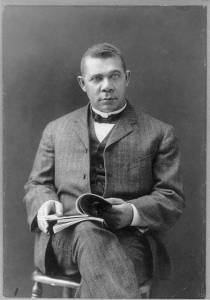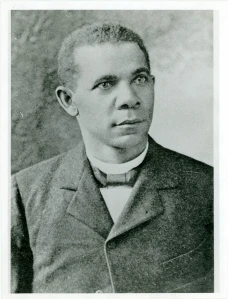Tuskegee University is a private, historically Black university in Tuskegee, Alabama. It was founded on July 4, 1881, as the Tuskegee Normal School for Colored Teachers.
The agreement to establish the school was made by a former Confederate Colonel, W.F. Foster, who was a candidate for re-election to the Alabama Senate, and Lewis Adams, a former slave and now a local Black leader in the community. Foster asked Adams what he wanted in exchange for securing the Black vote for him, and Adams said he wanted an educational institution for his people. As the Tuskegee University website reports, when Foster won the election he carried out his promise. With the assistance of his colleague in the House of Representatives, Arthur L. Brooks, legislation was passed for the establishment of a “Negro Normal School in Tuskegee.”

Lewis Adams
A $2,000 appropriation for teachers’ salaries was authorized by the legislation. There was no land, no buildings, and no teachers, but there was now legislation authorizing the school. A board of commissioners to get the school organized requested recommendations for teachers from Hampton Normal and Agricultural Institute in Virginia, a school opened in 1868 “to train selected Negro youth who should go out and teach and lead their people first by example.”
Booker T. Washington was born on April 5, 1856 near Hale’s Ford, Virginia on a tobacco plantation. He was born into slavery to Jane, an enslaved Black woman impregnated by a white man. He, his siblings, and mother gained freedom after the Civil War and the passage of the Thirteenth Amendment.
In 1872 at the age of sixteen, Washington enrolled at the Hampton Normal and Agricultural Institute, in Hampton, Virginia. From 1878 to 1879 he attended Wayland Seminary in Washington, D.C., and returned to teach at Hampton. It was Booker T. Washington that Hampton president Samuel C. Armstrong recommended to become the first principal at Tuskegee Institute. Such positions heading schools, even Black schools, had traditionally been held by whites. Booker T. Washington was 25 years old.
The new school opened on July 4, 1881, initially using space rented from a local church. The next year, Washington purchased a former plantation, which became the permanent site of the campus. Under his direction, his students literally built their own school: constructing classrooms, barns and outbuildings; growing their own crops and raising livestock, and providing for most of their own basic necessities. Both men and women had to learn trades as well as academics. The Tuskegee faculty utilized each of these activities to teach the students basic skills to take back to the mostly rural Black communities throughout the South. The school later grew to become the present-day Tuskegee University.

Tuskegee provided an academic education and instruction for teachers, but placed emphasis on providing Black males with practical skills, such as carpentry and masonry, which many would need for the rural lives most Blacks led in the South. The Institute illustrated Washington’s philosophy about his race. His theory was that by providing needed skills to society, African Americans would gain acceptance by white Americans. He believed that Blacks would eventually gain full participation in society by showing themselves to be responsible, reliable American citizens. Washington was head of the school until his death at age 59 in 1915.

A history class at the Tuskegee Institute in 1902, via Library of Congress
Tuskegee rose to national prominence under the leadership of its founder, Dr. Washington. During his tenure, institutional independence was gained in 1892, again through legislation, when Tuskegee Normal and Industrial Institute was granted authority to act independent of the state of Alabama.
Today, the university states as its mission not only providing a solid foundation in the liberal arts:
In addition, the University’s programs focus on nurturing the development of high-order intellectual and moral qualities among students and stress the connection between education and the highly trained leadership Americans need in general, especially for the work force of the 21st Century and beyond. The results we seek are students whose technical, scientific, and professional prowess has been not only rigorously honed, but also sensitively oriented in ways that produce public-spirited graduates who are both competent and morally committed to public service with integrity and excellence.”
Filed under: legal | Tagged: Black History |





Leave a comment